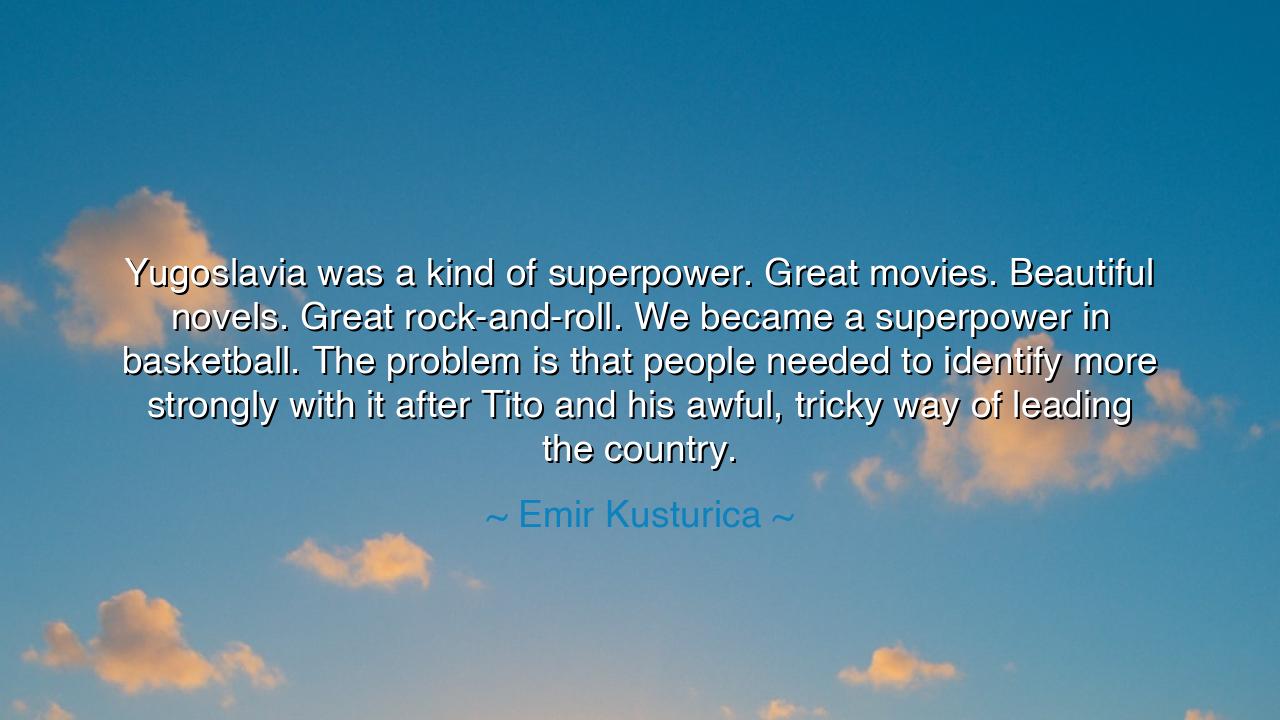
Yugoslavia was a kind of superpower. Great movies. Beautiful
Yugoslavia was a kind of superpower. Great movies. Beautiful novels. Great rock-and-roll. We became a superpower in basketball. The problem is that people needed to identify more strongly with it after Tito and his awful, tricky way of leading the country.






Listen now to the words of Emir Kusturica, a filmmaker whose life and art have been shaped by the history and the struggles of his homeland. He said, "Yugoslavia was a kind of superpower. Great movies. Beautiful novels. Great rock-and-roll. We became a superpower in basketball. The problem is that people needed to identify more strongly with it after Tito and his awful, tricky way of leading the country." These words carry within them the weight of a history lost, a nation that once stood as a beacon of cultural brilliance, but now lies fragmented and torn. Yugoslavia, like many empires before it, was a land of contradictions—a land of immense creativity and talent, but one whose political leadership was marred by complexity, manipulation, and ultimately, division.
To understand the meaning behind Kusturica’s statement, we must first reflect upon the legacy of Yugoslavia under the leadership of Josip Broz Tito. Tito, a man of considerable skill and cunning, managed to unite a collection of disparate peoples—Serbs, Croats, Bosnians, Slovenes, and others—into a single socialist federation. Under his leadership, Yugoslavia became a cultural superpower, producing some of the world’s most celebrated movies, novels, and music. The country became a vibrant hub of creativity, its people rising to great heights in the fields of art, sport, and science. It was a time of unity and ambition, a time when the world took notice of what this small, yet vibrant, country was producing.
Yet, Kusturica’s words point to a deeper truth—that while Tito’s leadership may have forged temporary unity, it was also built upon a foundation of compromise and manipulation. Tito’s trickiness, as Kusturica describes it, came from his ability to maintain the appearance of unity while carefully managing the competing nationalisms that simmered beneath the surface. Tito broke the surface of nationalism with a clever balancing act, keeping the peoples of Yugoslavia in check, but never truly resolving the underlying tensions. After his death in 1980, those tensions erupted, for the identity of Yugoslavia was never fully established—there was no singular sense of belonging, of being Yugoslavian, that tied the people together. The cultural riches of the country were undeniable, but the unity was fragile, and when Tito was gone, it became clear that the foundation was built not on shared identity, but on a delicate web of political control.
Consider the history of the Roman Empire, which, though vast and mighty, was ultimately brought low by the failure to establish a unified, enduring identity among its people. The Roman Empire spanned centuries and was home to remarkable achievements in engineering, art, and culture. Yet, as time went on, the empire became increasingly divided, with competing regional powers and a lack of unity that weakened its very foundation. The Roman Republic, too, had been an engine of greatness, but the political turmoil and manipulation by leaders such as Julius Caesar sowed the seeds of division. Like the downfall of Rome, Yugoslavia’s decline was born from the fracturing of identity after the central figure of leadership passed away. The unity created by Tito was not rooted in the hearts of the people but in a complicated political system that could not endure once his influence was removed.
Kusturica’s lament for Yugoslavia speaks to the fragility of unity when it is not built on a deep, genuine identity that resonates with all its people. The cultural superpower that Yugoslavia once represented could not stand the test of time, for it lacked the firm foundation of a common purpose and a shared sense of belonging. Greatness can never be sustained solely through external achievements or superficial unity. It must come from the hearts and minds of the people, from their shared beliefs and values, from a sense of collective identity that transcends politics and temporary alliances.
Now, O children of the future, what lesson can we take from this history? It is the lesson that identity and unity are the cornerstones of any lasting greatness. In your own lives, whether as individuals, communities, or nations, seek not only external successes, but a deep sense of belonging to something greater than yourselves. Just as Yugoslavia produced great art and culture, so too must you pursue greatness—not through imposed unity, but through the cultivation of a shared identity built on trust, understanding, and respect.
In your own pursuits, remember that true power and lasting achievement are not born of forceful unity or superficial agreement, but from a foundation that is built upon authentic connection, mutual respect, and a shared vision for the future. Do not be fooled by the illusion of external success; seek instead to create a world, a community, or a life that is rooted in genuine unity and purpose—for it is this foundation that will endure, long after the fleeting victories of today have faded.






AAdministratorAdministrator
Welcome, honored guests. Please leave a comment, we will respond soon